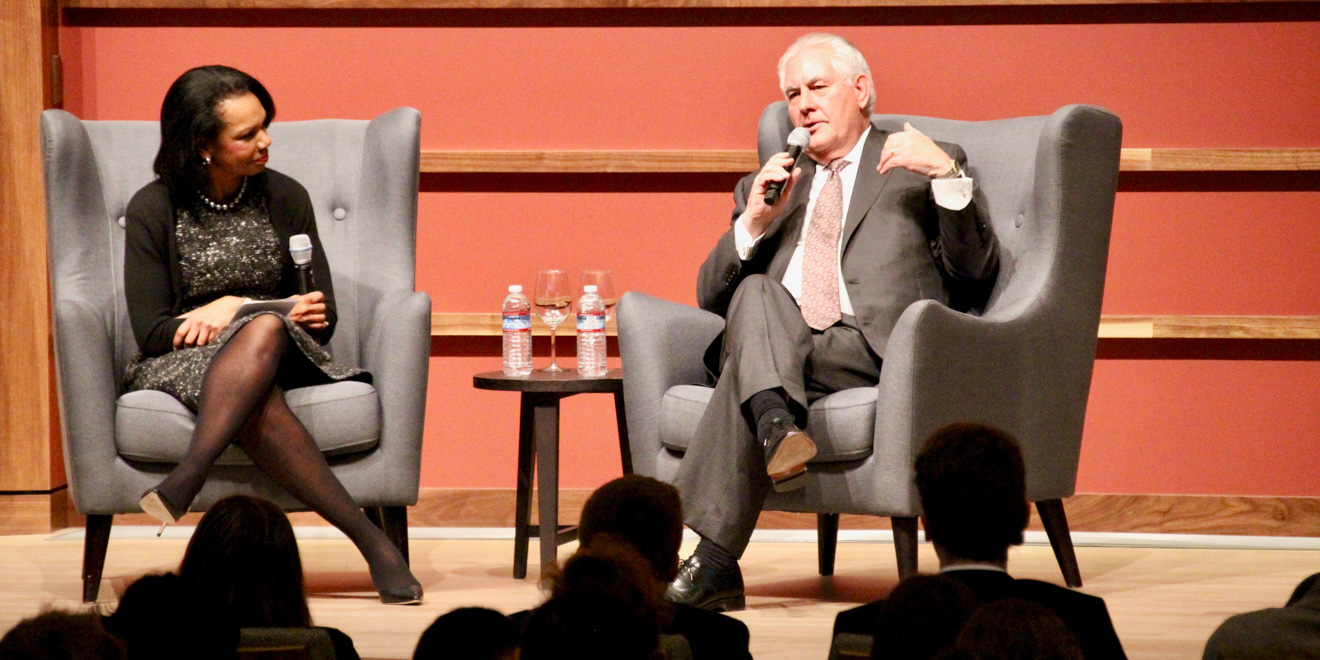In a Wednesday speech at the Hoover Institution, U.S. Secretary of State Rex Tillerson called the United States’ continued military presence in Syria necessary to protect national interests.
“ISIS has one foot in the grave, and by maintaining an American military presence in Syria until the full and complete defeat of ISIS is achieved, it will soon have two,” Tillerson said.
Tillerson later spoke in conversation with Graduate School of Business professor and Hoover senior fellow Condoleezza Rice, who served as U.S. Secretary of State under George W. Bush. Tillerson’s audience included former Secretary of State George Shultz.
Following introductory remarks by Hoover Institution Director Thomas Gilligan, Tillerson laid out the broad historical and political context behind the Syrian conflict and emphasized that the crisis is a concern for all international powers. Though the U.S. does not currently have a United Nations-mandated presence in Syria, Tillerson advocated for the U.S.’ continued military and diplomatic involvement — becoming the first member of the Trump administration to explicitly promise that America will maintain its presence in the region after the immediate conflict concludes.
“A new plan of action is a preferable alternative to more years of wishful thinking,” Tillerson said.
Tillerson emphasized the importance of taking action with regard to other political actors’ use of chemical weapons. He maintained that the U.S. cannot allow chemical weapons to be “regularized.”
“The Trump administration’s counterterrorism policy is quite simple,” he said. “It is to protect Americans at home and abroad from attacks by terrorists. Central to this policy is to deny terrorists and terrorist organizations the opportunity to organize … train, plan and execute attacks.”
Tillerson envisions a “stable, unified, independent Syria” under a post-Assad leadership as the administration’s first “key end state” to the conflict.
“It will be a victory for all, and it will support the ability of the Syrian people to pursue their own rights,” he said.
Tillerson’s ideal outcome includes the permanent defeat of ISIS, resolution of the conflict through a UN-led process, curtailed Iranian influence, conditions for the safe and voluntary return of refugees and a Syria free of weapons of mass destruction.
Tillerson alluded to the United States’ premature departure from Iraq in 2011, which he said allowed ISIS to survive. He promised the U.S. “would not let history repeat itself.”
In his remarks, Tillerson mentioned the enduring plight of Syrian refugees. Rice expressed her surprise when Tillerson mentioned “America’s values” in resolving the humanitarian crisis – values Rice said she believes are not typically associated with the current administration. Rice asked Tillerson to step back from the specific geopolitical conflict in Syria and speak broadly about “values, human rights and democracy in American foreign policy.”
The most important value is “the right to life,” Tillerson responded, adding that liberty and the pursuit of happiness naturally follow.
When Rice directed the conversation to Trump’s tweeting habits, Tillerson joked, “He’s world class at social media. I am not.” Tillerson predicted that he himself would “probably go to the grave without a social media account.” As a result, he said, his aides often print hard copies of the president’s tweets, which Tillerson then uses to shape foreign policy.
Heyward Smith, regional director of development at the Hoover Institution and an audience member, told The Daily he thinks it is “important to hear from the Secretary of State himself as to what our plans are and what has caused all this and what the future holds for it.”
“I think Hoover is a platform for Secretary Tillerson to come and speak and give the administration’s viewpoint, and I think Hoover acts as a place to share ideas,” he said.
Kristin Southard, who also attended the talk and is the recruitment, career services and alumni affairs manager for the Freeman Spogli Institute M.A. program, referred to Tillerson as “cagey” and said, “I think it’s important to know what’s happening right now so we can be informed going forward.”
Hoover Institution Research Fellow Abbas Milani, also co-director of the Iran Democracy Project at the Hoover Institution, echoed other audience members in emphasizing the high stakes of conflict in Syria.
“It’s important because it’s one of the most serious military engagements that the United States has right now,” he said. “What happens in Syria will shape to some extent what the whole landscape of the Middle East will be. The Middle East is a very important region for the world and for the United States, so the youth should pay much attention to it.”
Audience member and Hoover Institution intern Timothy Isaacs ’20 said he appreciated Tillerson’s remarks for their insight into the inner workings of the administration.
“I think much of the political dialogue at Stanford [has centered around] the unpopularity of the president; only 2 percent of Stanford’s campus voted for Trump,” Isaacs said. “But we still have a government, and it still has to function, and so seeing how those things are conducted and how the United States is continuing or discontinuing policies is really intriguing for anyone, even for those who don’t agree with the administration.”
Contact Alex Tsai at aotsai ‘at’ stanford.edu.
